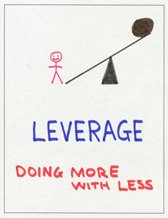(Doesn't the picture capture it - the smiling, unaware homeowner using leverage to raise the rock - which is just about to quickly roll down and crush him?)
This writer does a good job bringing the various data together, in a way which might make you feel like getting out of all stocks, real estate and investments quicker than you were thinking, and getting into cash. What makes this bubble in my book the mother of all bubbles is one thing:
Leverage. Crazy-out-of-control-never-before-seen leverage.
Among the highlights (or low-lights):
The housing bubble is in the early stages of implosion. We do not know for sure how long the adjustment will take or are we sure how deep it will be, but we do know it has to happen and that the risks to our economy and the world economy are enormous.
Sub-prime loans now make up over 50% of mortgages and with those come all sorts of exotic mortgages that borrowers do not understand and eventually won’t be able to service.
That means many millions of Americans will go broke and bankrupt over the next several years.
$11 trillion in real estate values in just a few years time could become $6 trillion in value
Today’s debt and leverage makes the 1920s look like child’s play
How can a market be solid and safe when you have to have new buyers whose average down payment is 3%? They’ll walk away from negative equity in a nanosecond. How many had to have mom and dad dig into their own home equity to buy that house? Worse yet, 45% of first-time buyers put down nothing on their new digs
Interest-only mortgages nationwide average 31%. In California, they make up 61%, and in Santa Rose and Vallejo, where they are 77% and 78% respectively. Would you have ever believed that bankers and the Fed would let this distortion go that far? Next year, 2006, about $300 billion in mortgage debt will enter its adjustable period.
December 30, 2005
The end of the housing bubble (Today's debt and leverage makes the 1920s look like child's play)
Posted by
blogger
at
12/30/2005
![]()
![]()
Subscribe to:
Post Comments (Atom)



4 comments:
anyone know the reprecussions of walking away from a home? I would imagine not paying your mortgage is a big blot on your credit record - but are we talking having to go chapter 11?
In the end, someone else (not the homeowner) holds the note on the house. That entity (say a bank) then tries to sell the home, recouping what they can on the loan.
HUD homes a plenty coming up...
In 91 the craze was the short sale. I sold $10,000 short of my mortgage which was $100,000 short of my purchase price.
RE new BK and walking away. Depending on what state, you can walk away from home and note holder can foreclose. There is judicial foreclosure and Trust Deed Sale. In Calif for example, 99% of foreclosures are Trust Deed Sale and no deficiency can be taken. However, IRS may get you with tax due on loan forgiveness. If in a jurisdiction that allows judicial foreclosure and deficiency judgment, you have the choice of paying the deficiency or filing BK. With new BK rules, if you're gainfully employed you will have to go through at least five years of having your income attached to pay the loan before you can file cptr 7. This is a general opinion re BK for the new laws are still not completely settled.
Well done post. I hope this can help.
Cash advance service payday loans for instant need of money
Personal cash advance loan for everyone who's in need of instant cash for an immediate expenses.
Personal Cash Advance
Offers fast, safe and easy online payday loans and cash advances with low rates. Experience how our payday loan works and get through our customized cash advance application.
Post a Comment